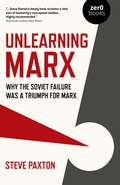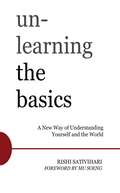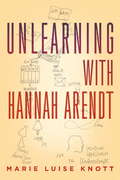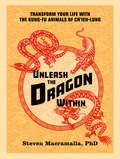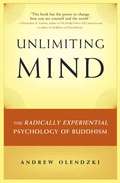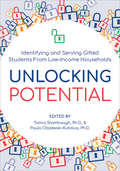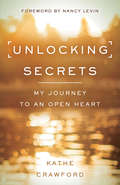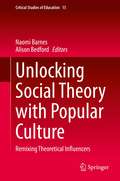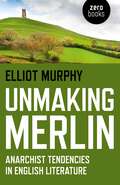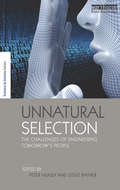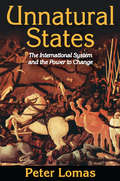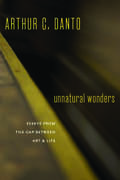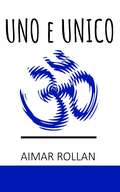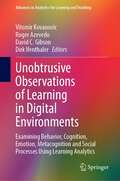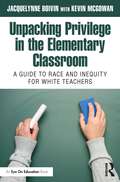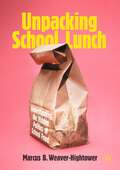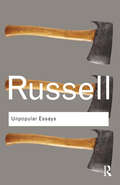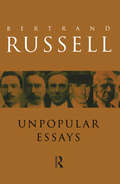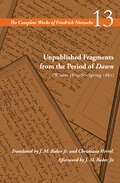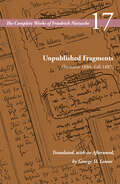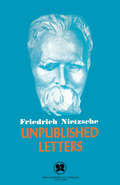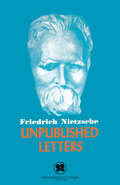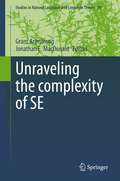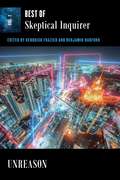- Table View
- List View
Unlearning Marx: Why the Soviet Failure was a Triumph for Marx
by Steve PaxtonThe theories of Karl Marx and the practical existence of the Soviet Union are inseparable in the public imagination, but for all the wrong reasons. This book provides detailed analyses of both Marx&’s theory of history and the course of Russian and Soviet development and delivers a new and insightful approach to the relationship between the two. Most analyses of the Soviet Union, from any perspective, focus on trying to explain the failure to establish socialism, giving too much weight to the political pronouncements of the regime. But, for Marx, this approach to historical explanation is back-to-front, it's the political tail wagging the economic dog. When we move our focus from the stated aims of building socialism, and look at what actually happened in Russia from emancipation in the 1860s, through the Soviet era to the 1990s, we can clearly see the patterns which Marx identified as the essential features of the transition from feudalism to capitalism in England from the sixteenth century to the nineteenth. As such, the Soviet experiment forms an important part of Russia&’s transition from feudalism to capitalism and provides an excellent example of the underlying forces at play in the course of historical development. Unlearning Marx will surprise Marx&’s admirers and his detractors alike, and not only shed new light on Marxism's relationship with the Soviet Union, but on his ongoing relationship with our world.
Unlearning the Basics
by Mu Soeng Rishi SativihariIn fresh and inviting language and making frequent use of strikingly clear diagrams and illustrations, Unlearning the Basics challenges many of our common-sense understandings about ourselves and the world. The author lays out a new way of seeing that enables us to live more serenely, more compassionately, and more free from the slings and arrows of our busy lives. Along the way, Rishi Sativihari looks at love and grasping, at "the great unfixables," and at how vulnerability and pain feed the "evolution of character" -all in the service of helping us return to our true home and find new ways to flourish. Grounded in the Buddhist tradition yet completely free from the formulas of traditional, tired presentations, Unlearning the Basics has an informal, straightforward style that will immediately captivate the reader.
Unlearning with Hannah Arendt
by Marie Luise KnottShort-listed for the Tractatus Essay Prize, an examination of the innovative strategies Arendt used to achieve intellectual freedom After observing the trial of Adolf Eichmann, Hannah Arendt articulated her controversial concept of the "banality of evil," thereby posing one of the most chilling and divisive moral questions of the twentieth century: How can genocidal acts be carried out by non-psychopathic people? By revealing the full complexity of the trial with reasoning that defied prevailing attitudes, Arendt became the object of severe and often slanderous criticism, losing some of her closest friends as well as being labeled a "self-hating Jew." And while her theories have continued to draw innumerable opponents, Arendt's work remains an invaluable resource for those seeking greater insight into the more problematic aspects of human nature. Anchoring its discussion in the themes of translation, forgiveness, dramatization, and even laughter, Unlearning with Hannah Arendt explores the ways in which this iconic political theorist "unlearned" recognized trends and patterns--both philosophical and cultural--to establish a theoretical praxis all her own. Through an analysis of the social context and intellectual influences--Karl Jaspers, Walter Benjamin, and Martin Heidegger--that helped shape Arendt's process, Knott has formed a historically engaged and incisive contribution to Arendt's legacy.
Unleash the Dragon Within: Transform Your Life With the Kung-Fu Animals of Ch'ien-Lung
by Steven MacramallaDiscover your Animal archetype to transform your martial arts practice and improve your physical, emotional, and sexual healthA cognitive psychologist and respected martial art instructor brings to life the Animals of Ch'ien-lung, and how to live the martial art philosophy--on and off the mat! This martial art belongs to everyone, not just for self-defense but as a force for healing. Keen on detail, big in scope, Unleash the Dragon Within shows how to tap into the Cat and Snakeaspects of your mind and body. When you combine the movement, breath and meditation of a Cat with a Snake you create the Dragon, bringing all you are to your athletic performance, spiritual practices and even your sexual relationships.
Unlimiting Mind
by Andrew OlendzkiBoth broad and deep, this eye-opening book is one of the best available overviews of the radical psychological teachings underlying the Buddhist approach to freedom and peace. Sophisticated without being daunting, brilliantly clear without becoming simplistic, Andrew Olendzki's writing is filled with rich phrases, remarkable images, and the fruits of decades of careful thought. Grounded in profound scholarship, psychological sophistication, and many years of teaching and personal practice, this much-anticipated collection of essays will appeal to anyone looking to gain a richer understanding of Buddhism's experiential tools for exploring the inner world. In Unlimiting Mind, Olendzki provokes fresh and familiar reflections on core Buddhist teachings.
Unlocking Potential: Identifying and Serving Gifted Students From Low-Income Households
by Paula Olszewski-Kubilius Tamra StambaughThis edited book, written by authors with extensive experience in working with gifted students from low-income households, focuses on ways to translate the latest research and theory into evidence-supported practices that impact how schools identify and serve these students. Readers will:Learn about evidence-supported identification systems, tools, and strategies for finding students from low-income households.Discover curriculum models, resources, and instructional strategies found effective from projects focused on supporting these students.Understand the important role that intra- and interpersonal skills, ethnicity/race, families, school systems, and communities play.Consider the perceptions of gifted students who grew up in low-income households.Learn how educators can use their experiences to strengthen current services.Unlocking Potential is the go-to resource for an up-to-date overview of best practices in identification, curriculum, instruction, community support, and program design for gifted learners from low-income households.
Unlocking Secrets: My Journey To An Open Heart
by Kathe CrawfordIn this inspiring, soul-searching, and deeply vulnerable memoir, Kathe Crawford lays bare the life of secrets that she kept for many years. When Crawford and her husband, Larry, discovered that Larry was HIV-positive in 1988, they decided to keep the diagnosis a secret from everyone, including their two children. Crawford kept this promise, layering secret upon secret, for almost 30 years, including for more than 20 years after Larry’s death and even as time revealed painful betrayals. Crawford’s journey of unlocking her own secrets, as well as her family’s, was the key to freeing her voice, opening her heart, and finding her true self.
Unlocking Social Theory with Popular Culture: Remixing Theoretical Influencers (Critical Studies of Education #15)
by Naomi Barnes Alison BedfordThis book demonstrates how pop culture examples can be used to demystify complex social theory. It provides tangible, metaphorical examples that shows how it is possible to "do philosophy" rather than subscribe to a theorist by showing that each theorist intersects and overlaps with others. The book is embedded in the literary theory that tapping into background knowledge is a key step in helping people engage with new and difficult texts. It also acknowledges the important role of popular culture in developing comprehension. Using a choose your own adventure structure, this book not only shows students of social theory how various theories can be applied but also reveals the multitude of possible pathways theory provides for comprehending society.
Unmaking Merlin: Anarchist Tendencies in English Literature
by Elliot MurphyA unique exploration of how anarchist philosophy and practice has inspired some of the English language's most revered, and reviled, authors.
Unnatural Selection: The Challenges of Engineering Tomorrow's People (The Earthscan Science in Society Series)
by Steve Rayner Peter HealeyWith ever-advancing scientific understanding and technological capabilities, humanity stands on the brink of the potential next stage of evolution: evolution engineered by us. Nanotechnology, biotechnology, information technology and cognitive science offer the possibility to enhance human performance, lengthen life-span and reshape our inherited physical, cognitive and emotional identities. But with this promise come huge risks, complex choices and fundamental ethical questions: about evolution; about what it is to be human; and about control over, and the distribution of benefits from, new technology. Written by a range of experts in science, technology, bioethics and social science, Unnatural Selection examines the range of technological innovations offering lives that purport to be longer, stronger, smarter and happier, and asks whether their introduction is likely to lead to more fulfilled individuals and a fairer world. The breadth of approaches and perspectives make important reading for anyone who cares about the implications of humanity engineering its own evolution.
Unnatural States: The International System and the Power to Change
by Peter Ian LomasUnnatural States is a radical critique of international theory, in particular, of the assumption of state agency—that states act in the world in their own right. Peter Lomas argues that since the universal states system is inequitable and rigid, and not all states are democracies anyway, this assumption is unreal, and to adopt it means reinforcing an unjust status quo.Looking at the concepts of state, nation, and agency, Lomas sees populations struggling to find an agreed model of the state, owing to inherited material differences; and unsurprisingly, among theorists of the nation, only controversy and a great confusion of terms. Meanwhile, the functional incarnations of the state agent are caricatures: the mandarin state, the lawyer state, the landlord state, the heir-to-history state, and the patriot state. Yet recent developments in international theory (constructivism, scientific realism, postmodernism) sacrifice state agency only at the price of an unhelpful abstraction.The states system is dysfunctional and obsolete, Lomas contends, and international theory must be recast, with morality as central, to inspire and to guide historic change. He focuses in his conclusion on prescriptions for change, led by four moral concerns: human rights, weapons of mass destruction, relations between rich and poor societies, and the environment."I begin this book," writes Lomas, "with the commonest commonplace of international theory, to expose it as a meaningless cliche. In the masterly hands of Hobbes, it was elaborated into a shock formula for organized society, a reading of history as civilization's failure. Kant sought to rescue morality from Hobbes and create the structures of modernity, but Kant's influence is coming to an end. In the Cold War, politicians disagreeing over another philosopher almost brought the world to an end. Hence the challenges of our time. These are primary and profound. Philosophers have done much to define the modern world. The point of international theory is to change it."
Unnatural Wonders: Essays from the Gap Between Art and Life
by Arthur C. DantoArthur C. Danto's essays not only critique bodies of work but reflect upon art's conceptual evolution as well, drawing for the reader a kind of "philosophical map" indicating how art and the criteria for judging it has changed over the twentieth century. In Unnatural Wonders the renowned critic finds himself at a point when contemporary art has become wholly pluralistic, even chaotic-with one medium as good as another-and when the moment for the "next thing" has already passed. So the theorist goes in search of contemporary art's most exhilarating achievements, work that bridges the gap between art and life, which, he argues, is now the definitive art of our time. Danto considers the work of such young artists as John Currin and Renee Cox and older living masters including Gerhard Richter and Sol LeWitt. He discusses artists of the New York School, like Philip Guston and Joan Mitchell, and international talents, such as the South African William Kentridge. Danto conducts a frank analysis of Matthew Barney's The Cremaster Cycle, Damien Hirst's skeletons and anatomical models, and Barbara Kruger's tchotchke-ready slogans; finds the ghost of Henry James in the work of Barnett Newman; and muses on recent Whitney Biennials and art influenced by 9/11. He argues that aesthetic considerations no longer play a central role in the experience and critique of art. Instead art addresses us in our humanity, as men and women who seek meaning in the "unnatural wonders" of art, a meaning that philosophy and religion are unable to provide.
Uno e Unico
by Valeria Bragante Aimar RollanUno e Unico è un saggio filosofico, una ricerca intellettuale che tenta di dare una risposta alle eterne domande della vita. L’opera consta di circa trenta temi universali, atemporali e che incombono su tutti gli esseri umani, senza considerare età, razza, nazionalità o religione professata. In quest’opera il lettore non troverà grandi affermazioni, né risposte certe. Non troverà dogmi, né dottrine. L’obiettivo di questo libro è far riflettere il lettore, generare in lui un pensiero critico, filosofico, mistico … In definitiva, offrirgli qualcosa che non solo sazi la sua conoscenza, ma che anche gli faccia intraprendere un viaggio interiore per conoscere sé stesso, affinchè trovi, lui stesso, le proprie conclusioni. Quest’opera è il risultato di molti anni di ricerca e riflessione, è una sintesi della conoscenza occidentale(scienza, filosofia, tecnologia …) e della saggezza orientale (yoga, vedanta, meditazione, zen …). "Vivere senza filosofare è, propriamente, avere gli occhi chiusi, senza tentare mai di aprirli". René Descartes.
Unobtrusive Observations of Learning in Digital Environments: Examining Behavior, Cognition, Emotion, Metacognition and Social Processes Using Learning Analytics (Advances in Analytics for Learning and Teaching)
by Roger Azevedo Vitomir Kovanovic David C. Gibson Dirk LfenthalerThis book integrates foundational ideas from psychology, immersive digital learning environments supported by theories and methods of the learning sciences, particularly in pursuit of questions of cognition, behavior and emotion factors in digital learning experiences. New and emerging foundations of theory and analysis based on observation of digital traces are enhanced by data science, particularly machine learning, with extensions to deep learning, natural language processing and artificial intelligence brought into service to better understand higher-order thinking capacities such as self-regulation, collaborative problem-solving and social construction of knowledge. As a result, this edited volume presents a collection of indicators or measurements focusing on learning processes and related behavior, (meta-)cognition, emotion and motivation, as well as social processes. In addition, each section of the book includes an invited commentary from a related field, such as educational psychology, cognitive science, learning science, etc.
Unpacking Privilege in the Elementary Classroom: A Guide to Race and Inequity for White Teachers
by Jacquelynne Boivin Kevin McGowanBrimming with reflection and resources, this book is ideal for white elementary teachers who wish to host conversations about race with their predominantly white classes.This book is a clear-cut guide for integrating antiracism into teaching and education, along with policy reform needed for systemic change. Providing hands-on experience and practical insights from literature, it breaks down subject-specific strategies to approach racial conversations. The book acknowledges the variety of challenges that teachers face and encourages them to continue self-work as a step towards supporting students.While specifically targeting all-white and predominantly white classrooms, this resource is suitable for additional professional development and educator preparation programs when considering a variety of racial dynamics.
Unpacking School Lunch: Understanding the Hidden Politics of School Food
by Marcus B. Weaver-HightowerThis book delves into the heated political battles over what kids eat at school, shedding light onto how policymakers craft food policy for schools. The book takes readers inside schools, through the history of school food programs in the United States and England, and into the policy terrain that makes school lunch difficult to change. Through diverse case studies—hungry linebackers, pink slime, English reality television and policy making, pizza as a vegetable, lunch shaming, and more—chapters provide detailed analysis of rhetorical tactics, arguments over, and policy for school feeding. The book concludes with a progressive vision of school food that is healthy, pleasurable, educative, shame-free, and, most importantly, free for all students, just like the rest of school.
Unpopular Essays
by Bertrand RussellTwelve adventures in argument by the winner of the 1950 Nobel Prize for Literature.
Unpopular Essays
by Bertrand RussellA classic collection of Bertrand Russell’s more controversial works, reaffirming his staunch liberal values, Unpopular Essays is one of Russell’s most characteristic and self-revealing books. Written to "combat… the growth in Dogmatism", on first publication in 1950 it met with critical acclaim and a wide readership and has since become one of his most accessible and popular books.
Unpopular Essays: Fourteen Adventures In Argument By 1950's Nobel Prize Winner (Routledge Classics Ser.)
by Bertrand RussellIn this volume of essays Bertrand Russell is concerned to combat, in one way or another, the growth of dogmatism, whether of the Right or of the Left, which has hitherto characterised our tragic century. This serious purpose inspires them even if, at times, they seem flippant; for those who are solemn and pontifical. In subject they range from Philosophy for the Layman, The Functions of a Teacher, and The Future of Mankind to an Outline of Intellectual Rubbish, Ideas that have helped Mankind and Ideas that have Harmed Mankind.
Unpublished Fragments from the Period of Dawn: Volume 13 (The Complete Works of Friedrich Nietzsche)
by Friedrich NietzscheThis volume provides the first English translation of Nietzsche's unpublished notes from late 1879 to early 1881, the period in which he authored Dawn, the second book in the trilogy that began with Human, All Too Human and concluded with The Joyful Science. In these fragments, we see Nietzsche developing the conceptual triad of morals, customs, and ethics, which undergirds his critique of morality as the reification into law or dogma of conceptions of good and evil. Here, Nietzsche assesses Christianity's role in the determination of moral values as the highest values and of redemption as the representation of humanity's highest aspirations. These notes show the resulting tension between Nietzsche's contrasting thoughts on modernity, which he critiques as an unrecognized aftereffect of the Christian worldview, but also views as the springboard to "the dawn" of a transformed humanity and culture. The fragments further allow readers insight into Nietzsche's continuous internal debate with exemplary figures in his own life and culture—Napoleon, Schopenhauer, and Wagner—who represented challenges to hitherto existing morals and culture—challenges that remained exemplary for Nietzsche precisely in their failure. Presented in Nietzsche's aphoristic style, Dawn is a book that must be read between the lines, and these fragments are an essential aid to students and scholars seeking to probe this work and its partners.
Unpublished Fragments: Volume 17 (The Complete Works of Friedrich Nietzsche)
by Friedrich NietzscheThe Complete Works of Friedrich Nietzsche will publish in its entirety, for the first time, an English translation of the full contents of the Kritische Studienausgabe. This volume of the Complete Works provides the first English translation of Nietzsche's unpublished notes from Summer 1886 through Fall 1887. In these writings we find drafts of new prefaces for the second editions of his earlier works, notes for the soon-to-appear On the Genealogy of Morality, and crucially, fragments and plans for an anticipated "master work" under the title "The Will to Power." This projected work, as is now well-known, was never written by Nietzsche; instead, it was fraudulently assembled by his sister Elisabeth Förster-Nietzsche and his friend Heinrich Köselitz (aka Peter Gast) and published under Nietzsche's name after his death. Only now, with the publication of this volume and the ones that precede and follow it, are English readers able to examine for themselves the full set of unpublished writings of the last creative period of Nietzsche's life. Taking into account the latest editorial work on his final notebooks, and including a detailed account by Mazzino Montinari of Nietzsche's decision not to complete a "master work," this volume documents the evolution of Nietzsche's thinking on such important themes as nihilism, eternal recurrence, and the revaluation of all values as it presents his late Nachlass free from the distortions perpetrated against it over a century ago.
Unpublished Letters
by Friedrich NietzscheDiscover the compelling private world of the most infamous philosopher of the nineteenth century in Unpublished Letters. Comprised of correspondence between Nietzsche's inner circle--including several titillating letters to his sister--Unpublished Letters gives readers a never-before-seen look into the philosopher's daily life.
Unpublished Letters
by Friedrich NietzscheThis collection of personal correspondence provides a rare window into the private life of the toweringnineteenth-century philosopher.Friedrich Nietzsche was the most iconoclastic philosopher of modern history. He is known to the world as the scathingly brilliant provocateur behind such foundational works as Thus Spoke Zarathustra, Beyond Good and Evil, and Twilight of the Idols. This was Nietzsche as he addressed himself to the public. But in this collection of his personal letters, we discover a very different man: Nietzsche the devoted son; the caring friend; the university student; the shy and distant lover. Comprised of correspondence between Nietzsche&’s inner circle—including several revelatory letters to his sister—Unpublished Letters gives readers a never-before-seen look into the philosopher&’s daily life.
Unraveling the complexity of SE (Studies in Natural Language and Linguistic Theory #99)
by Grant Armstrong Jonathan E. MacDonaldThis book makes a novel contribution to our understanding of Romance SE constructions by combining both diachronic and synchronic theoretical perspectives along with a range of empirical data from different languages and dialects. The collection, divided into four sections, proposes that SE constructions may be divided into one class that is the result of grammaticalization of a reflexive pronoun up the syntactic tree, from Voice and above, and another class that has resulted from the reanalysis of reflexive and anticausative morphemes as an argument expletive or verbal morpheme generated in positions from Voice and below. The contributions, while varied in both empirical content and theoretical approach, all serve to highlight different aspects of the overarching idea that SE constructions have evolved from these two distinct grammaticalization paths. The book appeals to researchers and academics in the field and closes with a unified approach to various SE constructions that makes important use of its status as a verbal morpheme. In addition to aligning a novel string of empirical contributions under a new theoretical umbrella, a clear research direction emerges from this volume based on the morphosyntactic nature of SE itself: Is it a clitic, an agreement morpheme, or a verbal morpheme?
Unreason: Best of Skeptical Inquirer
by Benjamin Radford Kendrick FrazierUNREASON: Exploring Pseudoscience, Conspiracies, and Extraordinary Claims is a collection of forty-five of the best articles the legendary Skeptical Inquirer magazine has published in the past decade. Featuring articles from writers including Neil deGrasse Tyson on the process of science, Richard Dawkins on the standards of truth, Elizabeth Loftus on memory, Steven Pinker on the notion of progress, and many others covering topics from the politicization of science to the frightening rise of misinformation, each entry in this collection brings scientific examination to bear in order to ferret out the facts and misconceptions behind popular claims.All of the articles within are interesting and readable. Yet they are also quite diverse. Some articles reinforce and complement each other; others (as happens in science) may voice disagreements or differing perspectives. But they all have one thing in common: a respect for evidence—a demand for the best, most well-tested, most scientifically reliable information. Readers will learn: Why and how conspiracy rumors start, spread, and readily gain believers How to stay afloat in a sea of disinformation and survive the age of misinformation Why and how we form beliefs and adhere to them so powerfullyHow and why memory is fallible—and what we can do about itHow pseudoexperiments mislead the public about scienceUnreason will arm readers with scientific knowledge to curb the misinformation and misconceptions that increasingly threaten our civil discourse. Even further, these essays present a way for us to be better citizens, equipped to deal with the winds of misinformation and disinformation swirling about us and better able to look ahead to a world where science and reason—indeed just good old common sense—can prevail.
